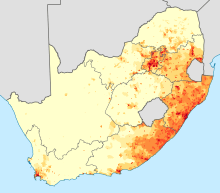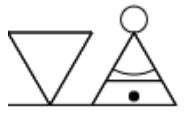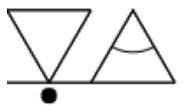Nguni languages
| Nguni | |
|---|---|
| Geographic distribution: | South Africa, Swaziland, Zimbabwe |
| Linguistic classification: | |
| Subdivisions: |
|
| Glottolog: | ngun1267[1] |
The Nguni languages are a group of Bantu languages spoken in southern Africa by the Nguni people. Nguni languages include Xhosa, Zulu, Swati, Hlubi, Phuthi, Bhaca, Lala, Nhlangwini and the three languages called Ndebele: Southern Transvaal Ndebele, Zimbabwean Ndebele and Sumayela Ndebele (the last two sometimes referred to as "Northern Ndebele"). The appellation "Nguni" derives from the Nguni cattle type. Ngoni (see below) is an older, or a shifted, variant.
It is sometimes argued that use of Nguni as a generic label suggests a historical monolithic unity of the peoples in question, where in fact the situation may have been more complex.[2] The linguistic use of the label (referring to a subgrouping of Bantu) is relatively stable.
Classification

|
0–20%
20–40%
40–60% |
60–80%
80–100% |

|
<1 /km²
1–3 /km²
3–10 /km²
10–30 /km²
30–100 /km² |
100–300 /km²
300–1000 /km²
1000–3000 /km²
>3000 /km² |
Within a subset of Southern Bantu, the label "Nguni" is used both genetically (in the linguistic sense) and typologically (quite apart from any historical significance).
The Nguni languages are closely related, and in many instances different languages are mutually intelligible; in this way, Nguni languages might better be construed as a dialect continuum than as a cluster of separate languages. On more than one occasion, proposals have been put forward to create a unified Nguni language.[3][4]
In scholarly literature on southern African languages, the linguistic classificatory category "Nguni" is traditionally considered to subsume two subgroups: "Zunda Nguni" and "Tekela Nguni."[5][6] This division is based principally on the salient phonological distinction between corresponding coronal consonants: Zunda /z/ and Tekela /t/ (thus the native form of the name Swati and the better-known Zulu form Swazi), but there is a host of additional linguistic variables that enables a relatively straightforward division into these two substreams of Nguni.
Zunda languages
- Zulu
- Xhosa
- Northern Ndebele (or 'Zimbabwean Ndebele')
- Southern Ndebele
Tekela languages
- Swazi
- Northern Transvaal Ndebele (Sumayela Ndebele)
- Phuthi [7]
- Bhaca [8]
- Hlubi (not the Hlubi dialect of Xhosa)[9]
- Lala
- Nhlangwini
Maho (2009) also lists S401 Old Mfengu†
Comparative data
Compare the following sentences:
| English | "I like your new sticks" |
|---|---|
| Zulu | Ngiyazithanda izinduku zakho ezintsha |
| Xhosa | Ndi-ya-zi-thanda ii-ntonga z-akho ezin-tsha |
| Southern Ndebele | Ngi-ya-zi-thanda iin-ntonga z-akho ezi-tjha |
| Northern Ndebele | Ngi-ya-zi-thanda i-ntonga z-akho ezin-tsha |
| Hlubi | Ng'ya-zi-thanda iin-duku z-akho ezin-sha |
| Swazi | Ngi-ya-ti-tsandza ti-ntfonga t-akho letin-sha |
| Mpapa Phuthi | Gi-ya-ti-tshadza ti-tfoga t-akho leti-tjha |
| Sigxodo Phuthi | Gi-ya-ti-tshadza ti-tshoga t-akho leti-tjha |
Note: Xhosa ⟨tsh⟩ = Phuthi ⟨tjh⟩ = IPA [tʃʰ]; Phuthi ⟨tsh⟩ = [tsh]; Zulu ⟨sh⟩ = IPA [ʃ], but in the environment cited here /ʃ/ is "nasally permuted" to [tʃ]. Phuthi ⟨jh⟩ = breathy voiced [dʒʱ] = Xhosa, Zulu ⟨j⟩ (in the environment here following the nasal [n]). Zulu, Swazi, Hlubi ⟨ng⟩ = [ŋ].
| English | "I understand only a little English" |
|---|---|
| Zulu | Ngisizwa kancane isiNgisi |
| Xhosa | Ndi-qonda ka-ncinci nje isi-Ngesi |
| Northern/Southern Ndebele | Ngi-zwisisa ka-ncani nje isi-Ngisi |
| Northern Ndebele | Ngi-zwisisa ka-ncani nje isi-Khiwa |
| Swazi | Ngi-siva ka-ncane nje si-Ngisi |
| Mpapa Phuthi | Gi-visisa ka-nci të-jhë Si-kguwa |
| Sigxodo Phuthi | Gi-visisa ka-ncinci të-jhë Si-kguwa |
Note: Phuthi ⟨kg⟩ = IPA [x].
Proto-Nguni
Proto-Nguni is the reconstructed ancestor of the Nguni languages.
Writing System
The sintu writing system, Isibheqe Sohlamvu (also known in Sotho as Ditema tsa Dinoko), for Southern Bantu languages, is used to represent all Nguni languages consistently under one orthography.[10] This includes Tekela languages, which, with the exception of Swati, are unstandardised in the Latin alphabet. For example, it contains a specific grapheme indicating vowel nasality – a feature which only occurs phonemically in Tekela languages:
| English | down/below | |
|---|---|---|
| Zunda | phansi |
 pʰaːntsʼi |
| Tekela | phãsi |
 pʰãːsi |
See also
- Ngoni is the ethnonym and language name of a group living in Malawi, who are a geographically distant descendant of South African Nguni. Ngoni separated from all other Nguni languages subsequent to the massive political and social upheaval within southern Africa, the mfecane, lasting until the 1830s.
- IsiNgqumo is an argot spoken by the homosexuals of South Africa who speak Bantu languages; as opposed to Gayle, the argot spoken by South African homosexuals who speak Germanic languages. IsiNgqumo is based on a Nguni lexicon.
References
- ↑ Hammarström, Harald; Forkel, Robert; Haspelmath, Martin; Bank, Sebastian, eds. (2016). "Nguni (S.40)". Glottolog 2.7. Jena: Max Planck Institute for the Science of Human History.
- ↑ Wright 1987.
- ↑ Eric P. Louw (1992). "Language and National Unity in a Post-Apartheid South Africa" (PDF). Critical Arts.
- ↑ Neville Alexander (1989). "Language Policy and National Unity in South Africa/Azania".
- ↑ Doke 1954.
- ↑ Ownby 1985.
- ↑ Donnelly 2009, p. 1-61.
- ↑ Jordan 1942.
- ↑ "Isizwe SamaHlubi: Submission to the Commission on Traditional Leadership Disputes and Claims: Draft 1" (PDF). July 2004. Retrieved 28 July 2011.
- ↑ isibheqe.org (2015). "Isibheqe Sohlamvu/Ditema tsa Dinoko". isibheqe.org.
Bibliography
- Doke, Clement Martyn (1954). The Southern Bantu Languages. Handbook of African Languages. Oxford: Oxford University Press.
- Donnelly, Simon (2009). "Aspects of Tone and Voice in Phuthi". Doctoral dissertation. University of Illinois at Urbana-Champaign.
- Jordan, Archibald C. (1942). "Some features of the phonetic and grammatical structure of Baca". Masters dissertation. University of Cape Town.
- Ownby, Caroline P. (1985). "Early Nguni History: The Linguistic Evidence and Its Correlation with Archeology and Oral Tradition". Doctoral dissertation. University of California, Los Angeles.
- Wright, J. (1987). "Politics, ideology, and the invention of the 'nguni'". In Tom Lodge. Resistance and ideology in settler societies. pp. 96–118.
Further reading
- Shaw, E. M. and Davison, P. (1973) The Southern Nguni (series: Man in Southern Africa) South African Museum, Cape Town
- Ndlovu, Sambulo. 'Comparative Reconstruction of Proto-Nguni Phonology'